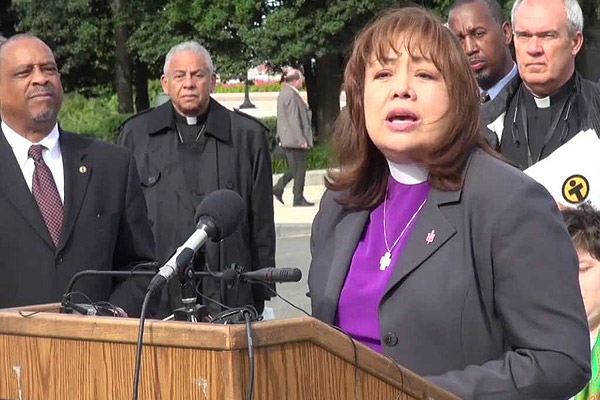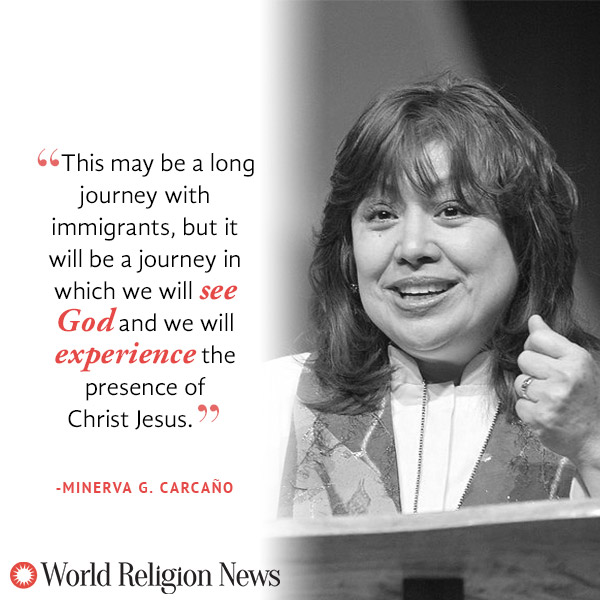
Interview with United Methodist Bishop Minerva G. Carcaño on Immigration Reform and How Methodists Can Support It
- By WRN Editorial Staff --
- 05 Jun 2015 --

An outspoken advocate for immigrants and reform, United Methodist Bishop is interviewed by FaithLink.
The first Hispanic female bishop in the episcopacy of The United Methodist Church and a native of Texas, Bishop Minerva G. Carcaño talks about immigration issues and how United Methodists support immigration reform.
This interview originally appeared in FaithLink in 2011. It’s presented as part of our #InTheirOwnWords series.
Immigration: An Interview With Bishop Minerva G. Carcaño by Alex Joyner
Joyner: What do you think are the most urgent issues in the debate on immigration right now?
“We have a lot of work to do in terms of compassionate care for our immigrant brothers and sisters who are suffering tremendously.” Carcaño: I always view the immigration issue as at least two-sided. One side is the political side and the great need for comprehensive immigration reform. The other side is the need for compassionate care for the immigrant among us. There is no political will in this country anywhere to work on comprehensive immigration reform, and that’s of great concern. Recently, President Obama came to the Southwest and talked about commitment to immigration reform. . . . One of [his statements] was that his administration was not in the business of separating immigrant families, which is not true. Immigrant families are being separated every day because we’ve got a broken immigration policy in this country. And so, there is not that true, clear, honest, political will to move comprehensive immigration reform. In the meantime, we’ve got immigrant families that are hurting across this country. We have children and young people who have been left behind because their families, their parents, have been deported. There’s a video about a young woman named Jasmine Franco, a member of First United Methodist Church [in Ypsilanti, Michigan]. Her mother was deported, her father self-deported. This young woman at the age of 17 stayed behind with her younger sister, and it’s the story of how the church cared for her. She eventually sent her younger sister to Guatemala, which is where her parents came from. We have a lot of work to do in terms of compassionate care for our immigrant brothers and sisters who are suffering tremendously.

Joyner: Are you aware of other churches that are doing that kind of witness?
Carcaño: Yes. We have a church in Tucson, Saint Francis [in the Foothills United Methodist Church], that has a number of its leaders who go out and they put in the water tanks in the desert because of the dangers of being in the desert. It is what our sisters and brothers who are immigrants experience all the time. Green Valley United Methodist Church along the border [has] a number of persons who go to the border and receive those who are being deported back into Mexico, and wash their feet, and remove blisters, and bind their feet and help these immigrants figure out a way to survive. As United Methodists, our Interagency Task Force on Immigration has invited annual conferences to set up rapid-response teams in the conferences, and about 25 of our conferences have set up such teams.
Joyner: Are the rapid-response teams primarily focused on responding to legislative initiatives?
Carcaño: Everything. Organizing prayer vigils, caring for children whose parents have been deported, doing the legislative piece––everything.
Looking at Comprehensive Reform
Joyner: What would a comprehensive approach to immigration look like? What are the aspects of such an approach that you feel are most important?
“When we talk about comprehensive immigration reform, we, as United Methodists, have said that it needs to reunify families that have been separated.Carcaño: When we talk about comprehensive immigration reform, we, as United Methodists, have said that it needs to reunify families that have been separated. It needs to assist those who are already here, to have a way of legalizing their status so that they can come out from under the shadows. It needs to address the fact that the labor needs of this country will continue to pull in immigrants, and there’s got to be a process for immigrants who come here to help us economically that does not place their lives at risk and that does not put them in that limbo of being undocumented. It also means that this country needs to care for workers in just ways, including the undocumented. We don’t set aside people’s human rights in terms of how they’re treated in jobs and how they’re treated economically because they’re undocumented. Another component is more oversight of the detention centers where immigrants are being held.
Joyner: How about the role of employers? Arizona had a recent effort to try to prevent employers from hiring undocumented people.
Carcaño: That’s correct. In January of 2009 the state officially moved into a law that would bring employers under legal judgment, a legal process, if they were known to hire undocumented workers. As of a few months ago, I had inquired as to how many employers had been charged with breaking that law, and I was told that one employer [had]. But what it did do was that it got a lot of immigrants fired, and we do know, because of the research work of [the Pew Research Center], that since January 2009, 100,000 immigrants, both documented and undocumented, have left the state of Arizona because of the repressive position of the state on immigration and immigrants themselves. And that has had an impact on our economy.
Joyner: Clearly immigrants provide much vitality for our country and much economic benefit. Why does that message not get through?
Carcaño: I think one factor at work is blatant racism. These are people that can be used because of the color of their skin, because of the culture, because of the language of their tongue. I think another factor is the economics. It is true that people are not paying immigrants fair wages, and so they are cutting costs, from the housewife that hires an immigrant to clean her home to the guy who builds whole developments. So, the abuse––it’s today’s slavery.
Reviving Us to Be a Prophetic Voice
“I believe that God is giving us a gift of grace and we need to respond.”
Joyner: I’m struck in this interview by your emphasis on the importance of creating a movement and the real moral failure in trying to address immigration reform. Is that message one that The United Methodist Church is still capable of delivering?
Carcaño: I think it is, and I think that it will give us strength, moral strength, ethical strength. It may revive us as a denomination to be again that prophetic voice that at one point gave shape to the moral character of this country, that helped shape generations of strong leaders for church and com-munity. I believe that God is giving us a gift of grace and we need to respond. We should not respond because of the gain. We should respond because it is the right thing and to not respond is to run the risk of losing our soul.
Joyner: What other parts of the biblical witness really speak to you about this issue?
“I am so struck by the fact that we people of the United States and even United Methodists will immediately say, ‘Those people shouldn’t be here. They’re not citizens. They don’t belong here. ‘”Carcaño: Matthew 25 certainly does. Leviticus 19 does as well [and] those passages in the Old Testament that talk about how we are to treat the immigrants. I am so struck by the fact that we people of the United States and even United Methodists will immediately say, “Those people shouldn’t be here. They’re not citizens. They don’t belong here. ” Then to read Holy Scripture that says you are to treat the immigrant as if he were a citizen among you. You are not to oppress him or her. You are to love them as you love yourself. Those are powerful words!
The Long Journey With Immigrants
Joyner: You grew up in a border region in Texas. I wonder how the border appears to you now as compared to when you were growing up.
“I am the daughter of an immigrant father and immigrant maternal grandmother.”Carcaño: I am the daughter of an immigrant father and immigrant maternal grandmother. I grew up just a few miles from the border between Texas and Mexico. To this day, my family lives on both sides of the border. When I was growing up, the border was a symbol of the fact that I was a child of both sides. I’m a US citizen. I was born here, but I also have that sense of cultural identity. I remember always that there have forever been rules about going and coming, but there seemed to be a kinder spirit, a border spirit. Today it is very severe, so severe that I’ve not been across the border in a number of years. Part of that is the violence in Mexico, and I just need to name that, but that, too, is interrelated with us and what we’ve done to Mexico. So, it’s a complex place, but ultimately for me the border is a rich place of faith and of culture and of possibilities of what God can do when God’s people come together.
“I hope and pray that we, United Methodists, will be committed to the journey for the long run because we ourselves are an immigrant people.”
Joyner: Is there anything else you would like to share?
Carcaño: This may be a long journey with immigrants, but it will be a journey in which we will see God and we will experience the presence of Christ Jesus. I hope and pray that we, United Methodists, will be committed to the journey for the long run because we ourselves are an immigrant people. We’re an immigrant people until Christ comes again or we are called to our eternal rest; and we have much to learn from those who are immigrant in the economic and political sense.
This interview originally appeared in FaithLink in 2011. It’s presented as part of our #InTheirOwnWords series.



















